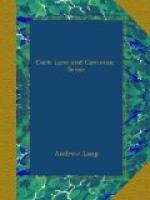It is a singular tale, and shows strange ideas of justice. Once condemned to the galleys, Mirabel might as well have made a clean breast of it; but this he did not do: he stuck to his bags and gold-coloured ribbon. Manifestly Mirabel would have had a better chance of being believed in court if he had dropped the ghost altogether. It is notable that Sir Walter probably gave his version of this affair from memory: he says that Mirabel ’was non-suited upon the ground that, if his own story was true, the treasure, by the ancient laws of France, belonged to the crown’.
Scott’s next case is very uninteresting, at least as far as it is given in Howell’s State Trials, vol. xii. (1692), p. 875.
A gentleman named Harrison had been accused of beguiling a Dr. Clenche into a hackney coach, on pretence of taking him to see a patient. There were two men in the coach, besides the doctor. They sent the coachman on an errand, and when he came back he found the men fled and Clenche murdered. He had been strangled with a handkerchief. On evidence which was chiefly circumstantial, Harrison was found guilty, and died protesting his innocence. Later a Mrs. Milward declared that her husband, before his death, confessed to her that he and a man named Cole were the murderers of Dr. Clenche. The ghost of her husband persecuted her, she said, till Cole was arrested. Mr. Justice Dolben asked her in court for the story, but feared that the jury would laugh at her. She asserted the truth of her story, but, if she gave any details, they are not reported. Cole was acquitted, and the motives of Mrs. Milward remain obscure.
Coming to the tract which he reprints, Sir Walter says that his notice was first drawn to it, in 1792, by Robert McIntosh, Esq., one of the counsel in the case, which was heard in Edinburgh, June 10, 1754. Grant of Prestongrange, the Lord Advocate well known to readers of Mr. Stevenson’s Catriona, prosecuted Duncan Terig or Clerk, and Alexander Bain Macdonald, for the murder of Sergeant Arthur Davies on September 28, 1749. They shot him on Christie Hill, at the head of Glenconie. There his body remained concealed for some time, and was later found with a hat marked with his initials, A. R. D. They are also charged with taking his watch, two gold rings, and a purse of gold, whereby Clerk, previously penniless, was enabled to take and stock two farms.
Donald Farquharson, in Glendee, deposes that, in June, 1750, Alexander Macpherson sent for him, and said that he was much troubled by the ghost of the serjeant, who insisted that he should bury his bones, and should consult Farquharson. Donald did not believe this quite, but trembled lest the ghost should vex him. He went with Macpherson, who showed the body in a peat-moss. The body was much decayed, the dress all in tatters. Donald asked Macpherson whether the apparition denounced the murderers: he replied that the ghost said it would have done so, had Macpherson not asked the question. They buried the body on the spot, Donald attested that he had seen the Serjeant’s rings on the hand of Clerk’s wife. For three years the prisoners had been suspected by the country side.




